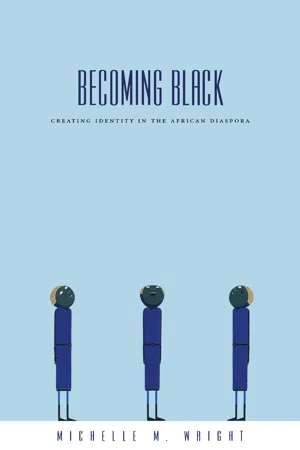
- English
- PDF
- Available on iOS & Android
About This Book
Becoming Black is a powerful theorization of Black subjectivity throughout the African diaspora. In this unique comparative study, Michelle M. Wright discusses the commonalties and differences in how Black writers and thinkers from the United States, the Caribbean, Africa, France, Great Britain, and Germany have responded to white European and American claims about Black consciousness. As Wright traces more than a century of debate on Black subjectivity between intellectuals of African descent and white philosophers, she also highlights how feminist writers have challenged patriarchal theories of Black identity.
Wright argues that three nineteenth-century American and European works addressing race—Thomas Jefferson's Notes on the State of Virginia, G. W. F. Hegel's Philosophy of History, and Count Arthur de Gobineau's Essay on the Inequality of the Human Races —were particularly influential in shaping twentieth-century ideas about Black subjectivity. She considers these treatises in depth and describes how the revolutionary Black thinkers W. E. B. Du Bois, Aimé Césaire, Léopold Sédar Senghor, and Frantz Fanon countered the theories they promulgated. She explains that while Du Bois, Césaire, Senghor, and Fanon rejected the racist ideologies of Jefferson, Hegel, and Gobineau, for the most part they did so within what remained a nationalist, patriarchal framework. Such persistent nationalist and sexist ideologies were later subverted, Wright shows, in the work of Black women writers including Carolyn Rodgers and Audre Lorde and, more recently, the British novelists Joan Riley, Naomi King, Jo Hodges, and Andrea Levy. By considering diasporic writing ranging from Du Bois to Lorde to the contemporary African novelists Simon Njami and Daniel Biyaoula, Wright reveals Black subjectivity as rich, varied, and always evolving.
Frequently asked questions
Information
Table of contents
- CONTENTS
- Acknowledgments
- Introduction: Being and Becoming Black in the West
- 1. The European and American Invention of the Black Other
- 2. The Trope of Masking in the Works of W. E. B. Du Bois, Léopold Sédar Senghor, and Aimé Césaire
- 3. Some Women Disappear: Frantz Fanon’s Legacy in Black Nationalist Thought and the Black (Male) Subject
- 4. How I Got Ovah: Masking to Motherhood and the Diasporic Black Female Subject
- 5. The Urban Diaspora: Black Subjectivities in Berlin, London, and Paris
- Epilogue: If the Black Is a Subject, Can the Subaltern Speak?
- Notes
- Bibliography
- Index